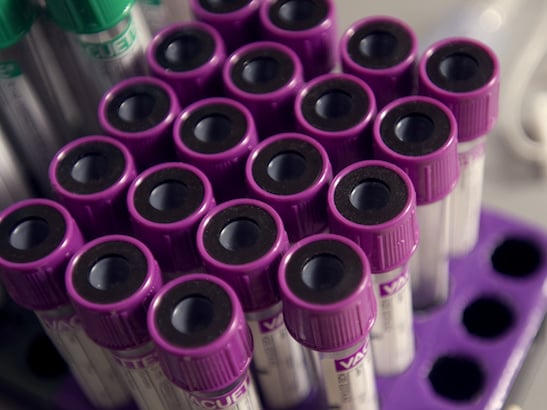
Researchers have developed a blood test that can detect whether patients with a type of locally advanced (non-metastatic) head and neck cancer have residual tumours after chemotherapy and radiotherapy.
The test detects DNA from the human papillomavirus (HPV) – a driver of head and neck cancer in some patients – as a proxy for the presence of residual cancer.
Labelled HPV16-detect by the researchers, the test could help to reduce the number of patients with HPV positive tumours who have neck surgery or repeat biopsies – which are currently the standard way to assess a patient’s response to treatment following an inconclusive PET-CT scan.
Validated against the ‘gold standard’
Developed by scientists at The Institute of Cancer Research, London, and The Royal Marsden NHS Foundation Trust, the test was designed for people with HPV-positive head and neck cancer.
These patients are on average younger than people with HPV-negative cancer, and respond better to treatment – meaning that they carry the side-effects of their treatment for longer.
In the study, the researchers recruited 88 patients with head and neck cancer and identified 47 with HPV-positive tumours using the current standard test, which involves laboratory analysis of an initial biopsy sample.
By comparing these results to those from HPV16-detect, the researchers were able to validate the blood test’s accuracy.
The new test detected all but two of the patients with HPV-positive tumours, and did not give any false positive results for patients with HPV-negative tumours.
After treatment, 36 of 37 patients who gave blood samples tested negative for traces of HPV. The final HPV-positive patient was found to have a recurrence of the disease that needed further treatment.
In contrast, PET-CT scans picked up abnormalities in six patients after treatment, none of which turned out to be cancerous.
The research was supported by a range of organisations including the NIHR Biomedical Research Centre at The Royal Marsden and The Institute of Cancer Research, Cancer Research UK, and the Oracle Cancer Trust.
Research at the ICR is underpinned by generous contributions from our supporters. Find out more about how you can contribute to our mission to make the discoveries to defeat cancer.
Avoiding unnecessary surgery
Writing in the British Journal of Cancer, the team noted that the incidence of locally advanced (stage III/IV) HPV-positive head and neck cancers is projected to rise by up to 230 per cent in the coming years.
By developing a test that can detect residual tumours in these patients, the researchers hope to reduce the number of patients undergoing unnecessary surgery, while making it easier to detect those patients who have relapsed.
They plan to analyse the test in a larger sample of patients before making a recommendation for its wider use in treatment.
Improved quality of life for patients
Dr Shreerang Bhide, Associate Honorary Faculty at the ICR and Consultant Clinical Oncologist at The Royal Marsden, who led the research, said:
“Among cases of head and neck cancer, patients with HPV-positive disease tend to be younger and have better survival rates.
“As a result, these patients need to live with the effects of their treatment for longer.
“This research shows that a blood test for HPV DNA can be used to identify how patients have responded to treatment, and therefore has the potential to spare them unnecessary surgery and significantly improve their quality of life.”
